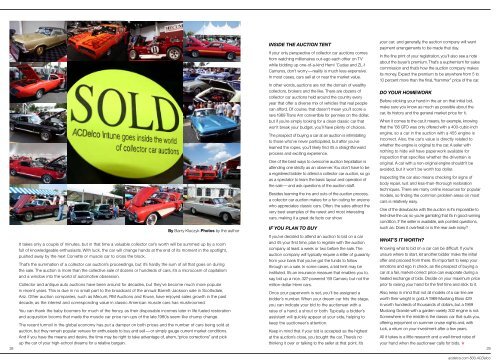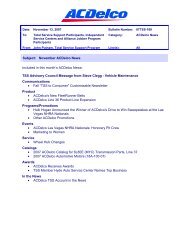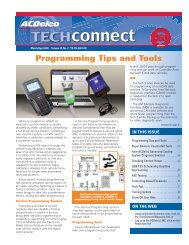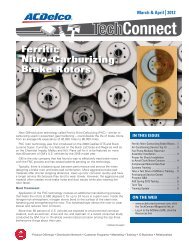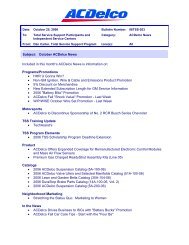You're Saving. - ACDelco TechConnect
You're Saving. - ACDelco TechConnect
You're Saving. - ACDelco TechConnect
Create successful ePaper yourself
Turn your PDF publications into a flip-book with our unique Google optimized e-Paper software.
28<br />
by Barry Kluczyk photos by the author<br />
It takes only a couple of minutes, but in that time a valuable collector car’s worth will be summed up by a room<br />
full of knowledgeable enthusiasts. With luck, the car will change hands at the end of its moment in the spotlight,<br />
pushed away by the next Corvette or muscle car to cross the block.<br />
That’s the summation of a collector car auction’s proceedings, but it’s hardly the sum of all that goes on during<br />
the sale. The auction is more than the collective sale of dozens or hundreds of cars, it’s a microcosm of capitalism<br />
and a window into the world of automotive obsession.<br />
Collector and antique auto auctions have been around for decades, but they’ve become much more popular<br />
in recent years. This is due in no small part to the broadcast of the annual Barrett-Jackson sale in Scottsdale,<br />
Ariz. Other auction companies, such as Mecum, RM Auctions and Kruse, have enjoyed sales growth in the past<br />
decade, as the interest and corresponding value in classic American muscle cars has mushroomed.<br />
You can thank the baby boomers for much of the frenzy, as their disposable incomes later in life fueled restoration<br />
and acquisition booms that made the muscle car price run-ups of the late 1980s seem like chump change.<br />
The recent turmoil in the global economy has put a damper on both prices and the number of cars being sold at<br />
auction, but they remain popular venues for enthusiasts to buy and sell— or simply gauge current market conditions.<br />
And if you have the means and desire, the time may be right to take advantage of, ahem, “price corrections” and pick<br />
up the car of your high-school dreams for a relative bargain.<br />
insiDe the auCtion tent<br />
If your only perspective of collector car auctions comes<br />
from watching millionaires out-ego each other on TV<br />
while bidding up one-of-a-kind hemi ’Cudas and ZL-1<br />
Camaros, don’t worry—reality is much less expensive.<br />
In most cases, cars sell at or near the market value.<br />
In other words, auctions are not the domain of wealthy<br />
collectors, brokers and the like. There are dozens of<br />
collector car auctions held around the country every<br />
year that offer a diverse mix of vehicles that real people<br />
can afford. Of course, that doesn’t mean you’ll score a<br />
rare 1969 Trans Am convertible for pennies on the dollar,<br />
but if you’re simply looking for a clean classic car that<br />
won’t break your budget, you’ll have plenty of choices.<br />
The prospect of buying a car at an auction is intimidating<br />
to those who’ve never participated, but after you’ve<br />
learned the ropes, you’ll likely find it’s a straightforward<br />
process and exciting experience.<br />
One of the best ways to overcome auction trepidation is<br />
attending one strictly as an observer. You don’t have to be<br />
a registered bidder to attend a collector car auction, so go<br />
as a spectator to learn the basic layout and operation of<br />
the sale — and ask questions of the auction staff.<br />
Besides learning the ins and outs of the auction process,<br />
a collector car auction makes for a fun outing for anyone<br />
who appreciates classic cars. Often, the sales attract the<br />
very best examples of the rarest and most interesting<br />
cars, making it a great de facto car show.<br />
if you Plan to buy<br />
If you’ve decided to attend an auction to bid on a car<br />
and it’s your first time, plan to register with the auction<br />
company at least a week or two before the sale. The<br />
auction company will typically require a letter of guaranty<br />
from your bank that you’ve got the funds to follow<br />
through on a sale. In some cases, a bid limit may be<br />
instituted. It’s an insurance measure that enables you to,<br />
say, bid up a nice, 327-powered ’69 Camaro, but not the<br />
million-dollar hemi cars.<br />
Once your paperwork is set, you’ll be assigned a<br />
bidder’s number. When your dream car hits the stage,<br />
you can indicate your bid to the auctioneer with a<br />
raise of a hand, a shout or both. Typically, a bidder’s<br />
assistant will quickly appear at your side, helping to<br />
keep the auctioneer’s attention.<br />
Keep in mind that if your bid is accepted as the highest<br />
at the auction’s close, you bought the car. There’s no<br />
thinking it over or talking to the seller at that point. It’s<br />
your car; and generally, the auction company will want<br />
payment arrangements to be made that day.<br />
In the fine print of your registration, you’ll also see a note<br />
about the buyer’s premium. That’s a euphemism for sales<br />
commission and that’s how the auction company makes<br />
its money. Expect the premium to be anywhere from 5 to<br />
10 percent more than the final, “hammer” price of the car.<br />
Do your homework<br />
Before sticking your hand in the air on that initial bid,<br />
make sure you know as much as possible about the<br />
car, its history and the general market price for it.<br />
When it comes to the car, it means, for example, knowing<br />
that the ’68 gTO was only offered with a 400-cubic-inch<br />
engine, so a car in the auction with a 455 engine is<br />
incorrect. Also, the car’s value is directly related to<br />
whether the engine is original to the car. A seller with<br />
nothing to hide will have paperwork available for<br />
inspection that specifies whether the drivetrain is<br />
original. A car with a non-original engine shouldn’t be<br />
avoided, but it won’t be worth top dollar.<br />
Inspecting the car also means checking for signs of<br />
body repair, rust and less-than-thorough restoration<br />
techniques. There are many online resources for popular<br />
models, so finding the common problem areas on most<br />
cars is relatively easy.<br />
One of the drawbacks with the auction is it’s impossible to<br />
test-drive the car, so you’re gambling that it’s in good running<br />
condition. If the seller is available, ask pointed questions,<br />
such as: Does it overheat or is the rear axle noisy?<br />
what’s it worth?<br />
Knowing what to bid on a car can be difficult. If you’re<br />
unsure where to start, let another bidder make the initial<br />
offer and proceed from there. It’s important to keep your<br />
emotions and ego in check, as the prospect of buying a<br />
car at a fair, market-correct price can evaporate during a<br />
heated exchange of bids. Decide on your maximum price<br />
prior to raising your hand for the first time and stick to it.<br />
Also, keep in mind that not all models of a car line are<br />
worth their weight in gold. A 1969 Mustang Boss 429<br />
is worth hundreds of thousands of dollars, but a 1969<br />
Mustang grande with a garden-variety 302 engine is not.<br />
Somewhere in the middle is the classic car that suits you,<br />
offering enjoyment on summer cruise nights and, with<br />
luck, a return on your investment after a few years.<br />
All it takes is a little research and a well-timed raise of<br />
your hand when the auctioneer calls for bids. n<br />
29<br />
acdelco.com 800.<strong>ACDelco</strong>


